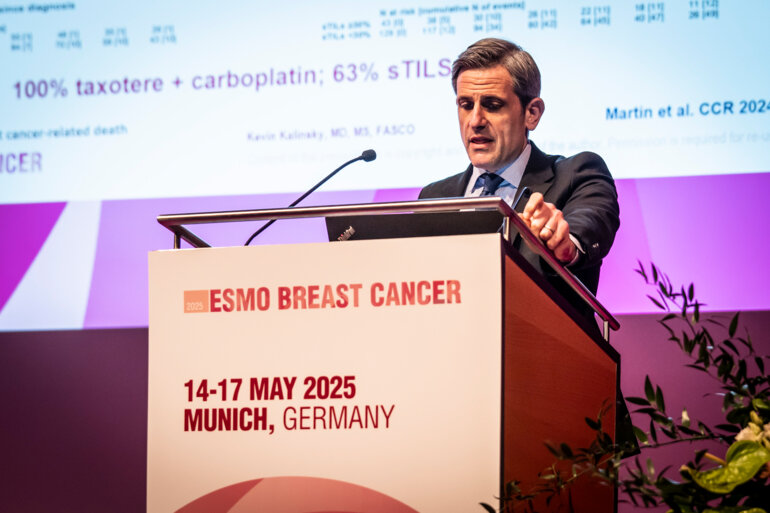
Relacorilant added to nab-paclitaxel prolongs progression-free survival in platinum-resistant ovarian cancer
The ROSELLA trial highlights the efficacy and tolerability of the combination even in patients with a poorer prognosis

An analysis reveals distinct patterns of expression of antibody–drug conjugate targets in high-grade serous ovarian cancer
A small Japanese study provides useful insights on determining the role of these agents in cancer care, but studies in larger, more diverse populations are needed

Experts recommend limiting germline genetic testing for breast cancer to seven genes
Newly-released ESMO recommendations critically assess specific germline pathogenic variants in terms of cancer-related mortality and testing implications for patients and their families

AI integration in breast cancer – a long way ahead?
Experts’ discussions during ESMO Breast 2025 provided an overview on promises and challenges in the field

Will voice-enabled AI have a role in oncology?
Progress in artificial intelligence tools is opening-up novel modalities to provide education and doctor-patient communication

Study findings support a growing shift towards “personalised de-escalation” treatment strategies in anal and rectal cancer care
Reduced-dose chemoradiotherapy and non-surgical strategies show promising outcomes with fewer long-term side-effects in lower gastrointestinal cancers

Tucatinib combo continues to show durable benefit in HER2-mutated metastatic breast cancer
Final data from the SGNTUC-019 trial support the use of the agent with trastuzumab in heavily pretreated patients

Neoadjuvant PD-1 blockade achieves encouraging clinical response in early-stage dMMR tumours
Findings from a small study support a non-surgical and tumour-agnostic approach with immunotherapy, but further research is needed

Promising early results for emiltatug ledadotin in heavily pretreated triple-negative breast cancer
Phase 1 trial data highlights preliminary efficacy and manageable safety of B7-H4–targeted antibody-drug conjugate in women receiving at least one prior topoisomerase-1 ADC

TILs show value in predicting relapse risk in TNBC
Retrospective data suggest that patients with low baseline TILs and nodal involvement have poor prognosis despite achieving pathological complete response
